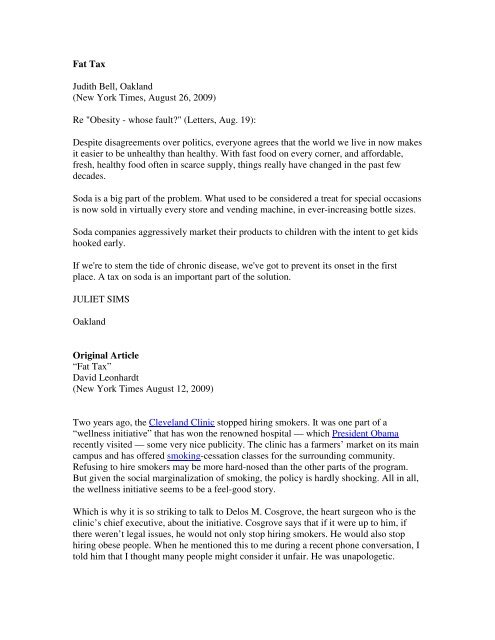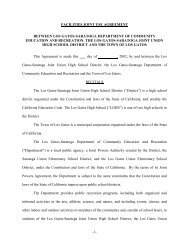Fat Tax Judith Bell, Oakland (New York Times, August 26, 2009) Re ...
Fat Tax Judith Bell, Oakland (New York Times, August 26, 2009) Re ...
Fat Tax Judith Bell, Oakland (New York Times, August 26, 2009) Re ...
You also want an ePaper? Increase the reach of your titles
YUMPU automatically turns print PDFs into web optimized ePapers that Google loves.
<strong>Fat</strong> <strong>Tax</strong><strong>Judith</strong> <strong>Bell</strong>, <strong>Oakland</strong>(<strong>New</strong> <strong>York</strong> <strong>Times</strong>, <strong>August</strong> <strong>26</strong>, <strong>2009</strong>)<strong>Re</strong> "Obesity - whose fault?" (Letters, Aug. 19):Despite disagreements over politics, everyone agrees that the world we live in now makesit easier to be unhealthy than healthy. With fast food on every corner, and affordable,fresh, healthy food often in scarce supply, things really have changed in the past fewdecades.Soda is a big part of the problem. What used to be considered a treat for special occasionsis now sold in virtually every store and vending machine, in ever-increasing bottle sizes.Soda companies aggressively market their products to children with the intent to get kidshooked early.If we're to stem the tide of chronic disease, we've got to prevent its onset in the firstplace. A tax on soda is an important part of the solution.JULIET SIMS<strong>Oakland</strong>Original Article“<strong>Fat</strong> <strong>Tax</strong>”David Leonhardt(<strong>New</strong> <strong>York</strong> <strong>Times</strong> <strong>August</strong> 12, <strong>2009</strong>)Two years ago, the Cleveland Clinic stopped hiring smokers. It was one part of a“wellness initiative” that has won the renowned hospital — which President Obamarecently visited — some very nice publicity. The clinic has a farmers’ market on its maincampus and has offered smoking-cessation classes for the surrounding community.<strong>Re</strong>fusing to hire smokers may be more hard-nosed than the other parts of the program.But given the social marginalization of smoking, the policy is hardly shocking. All in all,the wellness initiative seems to be a feel-good story.Which is why it is so striking to talk to Delos M. Cosgrove, the heart surgeon who is theclinic’s chief executive, about the initiative. Cosgrove says that if it were up to him, ifthere weren’t legal issues, he would not only stop hiring smokers. He would also stophiring obese people. When he mentioned this to me during a recent phone conversation, Itold him that I thought many people might consider it unfair. He was unapologetic.
“Why is it unfair?” he asked. “Has anyone ever shown the law of conservation of matterdoesn’t apply?” People’s weight is a reflection of how much they eat and how active theyare. The country has grown fat because it’s consuming more calories and burning fewer.Our national weight problem brings huge costs, both medical and economic. Yet our antiobesityefforts have none of the urgency of our antismoking efforts. “We should declareobesity a disease and say we’re going to help you get over it,” Cosgrove said.You can disagree with the doctor — you can even be offended — and still come to seethat there is a larger point behind his tough-love approach. The debate over health carereform has so far revolved around how insurers, drug companies, doctors, nurses andgovernment technocrats might be persuaded to change their behavior. And for the sake ofthe economy and the federal budget, they do need to change their behavior. But there hasbeen far less discussion about how the rest of us might also change our behavior. It’s as ifwe have little responsibility for our own health. We instead outsource it to somethingcalled the health care system.The promise of that system is undeniably alluring: whatever your ailment, a pill or aprocedure will fix it. Yet the promise hasn’t been kept. For all the miracles that modernmedicine really does perform, it is not the primary determinant of most people’s health. J.Michael McGinnis, a senior scholar at the Institute of Medicine, has estimated that only10 percent of early deaths are the result of substandard medical care. About 20 percentstem from social and physical environments, and 30 percent from genetics. The biggestcontributor, at 40 percent, is behavior.Today, the great American public-health problem is indeed obesity. The statistics havebecome rote, but consider that people in their 50s are about 20 pounds heavier on averagethan 50-somethings were in the late 1970s. As a convenient point of reference, a typicalcar tire weighs 20 pounds.This extra weight has caused a sharp increase in chronic diseases, like diabetes, that areunusually costly. Other public-health scourges, like lung cancer, have tended to kill theirvictims quickly, which (in the most tragic possible way) holds down their long-term cost.Obesity is different. A recent article in Health Affairs estimated its annual cost to be $147billion and growing. That translates into $1,250 per household, mostly in taxes andinsurance premiums.A natural response to this cost would be to say that the people imposing it on societyshould be required to pay it. Cosgrove mentioned to me an idea that some economistsfavor: charging higher health-insurance premiums to anyone with a certain body-massindex. Harsh? Yes. Fair? You can see the argument. And yet it turns out that the obesealready do pay something resembling their fair share of medical costs, albeit in anindirect way. Overweight workers are paid less than similarly qualified, thinnercolleagues, according to research by Jay Bhattacharya and M. Kate Bundorf of Stanford.The cause isn’t entirely clear. But the size of the wage difference is roughly similar to thesize of the difference in their medical costs.
It’s also worth noting that the obese, as well as any of the rest of us suffering from amedical condition affected by behavior, already have plenty of incentive to get healthy.But we struggle to do so. Daily life gets in the way. Inertia triumphs.The question of personal responsibility, then, ends up being more complicated than itmay seem. It’s hard to argue that Americans have collectively become more irresponsibleover the last 30 years; the murder rate has plummeted, and divorce and abortion rateshave fallen. And our genes certainly haven’t changed in 30 years.What has changed is our environment. Parents are working longer, and takeout mealshave become a default dinner. Gym classes have been cut. The real price of soda hasfallen 33 percent over the last three decades. The real price of fruit and vegetables hasrisen more than 40 percent.The solutions to these problems are beyond the control of any individual. They involve adifferent sort of responsibility: civic — even political — responsibility. They depend onthe kind of collective action that helped cut smoking rates nearly in half. Anyone whosmoked in an elementary-school hallway today would be thrown out of the building. Butif you served an obesity-inducing, federally financed meal to a kindergartner, you wouldfit right in. <strong>Tax</strong>es on tobacco, meanwhile, have skyrocketed. A modest tax on sodas —one of the few proposals in the various health-reform bills aimed at health, rather thanhealth care — has struggled to get through Congress.Cosgrove’s would-be approach may have its problems. The obvious one is its severity.The more important one is probably its narrowness: not even one of the nation’s mostprestigious hospitals can do much to reduce obesity. The government, however, can. Andthat is the great virtue of Cosgrove’s idea. He is acknowledging that any effort to attackobesity will inevitably involve making value judgments and even limiting people’schoices. Most of the time, the government has no business doing such things. But there isreally no other way to cure an epidemic.David Leonhardt is an economics columnist for The <strong>Times</strong> and a staff writer for themagazine.





